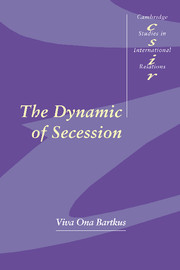6 - The benefits of secession
Published online by Cambridge University Press: 22 September 2009
Summary
The benefits of secession are a constant force for the endeavor. They can be understood as benefits either for the elites or for the community in general. For the narrow class of political elites, the material and prestige advantages associated with an independent state are extensive. Secession sometimes represents an acceptable means toward achievement of these advantages. The case of Nigerian politics during the last decade before formal British withdrawal illustrates the point. Furthermore, for the community as a whole, secession can represent the fulfillment of dreams inspired by the principle of national self-determination. Grounded in nineteenth-century notions of popular sovereignty, the doctrine established an intimate connection between the nation and the political organization of a state. It originally proposed that the basis of legitimacy must depend on the people's desires, rather than the ruling monarchs. Although this political ideal remains elusive, it has captured the imagination of numerous subjected communities.As a result, it has made foreign rule not only objectionable, but at times untenable as well. The principle of national self-determination has therefore provided both the catalyst and the justification for demands for territorial adjustments and political change, usually in the form of unification, irredentism, or secession. Returning to our metaphorical scales, in the balance of the costs and benefits associated with the decision to secede, both factors – elite self-interest and popular self-determination – weigh heavily in favor of the attempt.
- Type
- Chapter
- Information
- The Dynamic of Secession , pp. 96 - 114Publisher: Cambridge University PressPrint publication year: 1999

